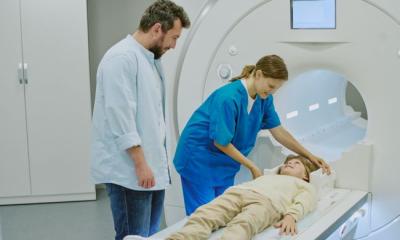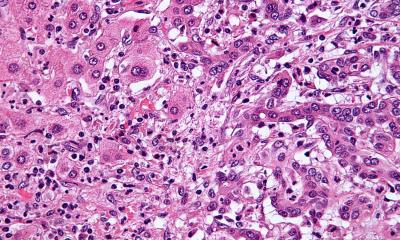News • DMD & rhabdomyosarcoma
Duchenne muscular dystrophy: Muscle stem cells can drive cancer
People with Duchenne muscular dystrophy (DMD) can develop an otherwise-rare muscle cancer, called rhabdomyosarcoma, due to the muscle cells’ continuous work to rebuild the damaged tissue. However, little is known about how the cancer arises, hindering development of a treatment or test that could predict cancer risk.
Now, scientists from Sanford Burnham Prebys Medical Discovery Institute (SBP) have demonstrated that muscle stem cells may give rise to rhabdomyosarcoma that occurs during DMD—and identified two genes linked to the tumor’s growth. The research, performed using a mouse model of severe DMD, helps scientists better understand how rhabdomyosarcoma develops in DMD—and indicates that ongoing efforts to develop treatments that stimulate muscle stem cells should consider potential cancer risk. The study was now published in Cell Reports.

“Scientists, including our team, are interested in harnessing muscle stem cells’ inherent power to generate new muscle tissue to treat DMD. Thus, understanding the cell’s behavior during disease is important so we know how to use the cells most effectively,” says Alessandra Sacco, Ph.D., senior author of the paper and associate professor in the Development, Aging and Regeneration Program at SBP. “In addition to deepening our understanding of how this cancer may occur in DMD, our findings highlight the importance of careful assessment of muscle stem cells’ health when developing potential DMD treatments.
DMD is a genetic condition caused by a lack of dystrophin, a protein that strengthens muscles. The condition causes progressive muscle degeneration and primarily affects boys, with symptoms often beginning between the ages of 3 and 5. With recent medical advances, children with DMD are now surviving beyond their teenage years into their early 30s, but effective treatments are still needed.
This research might yield molecular targets that could lead to treatments for rhabdomyosarcoma in DMD
Alessandra Sacco
In the study, the scientists found that mice with more severe DMD developed rhabdomyosarcoma sooner, indicating that increased muscle degeneration promotes cancer development. Next, they isolated several cells involved in muscle regeneration from mice with severe DMD and tested their ability to become tumors. In contrast to the other cells, muscle stem cells had an increased ability to replicate (self-renew) and formed tumors when grown independently. The muscle stem cells also showed early signs they would develop into tumors, including increased self-renewal, accumulation of DNA damage and gene expression patterns similar to those seen in human rhabdomyosarcoma.
Using RNA sequencing, the scientists also identified two genes associated with the tumor’s growth, Ccl11 and Rgs5, which are involved in inflammation and wound healing. When the scientists added Ccl11 and Rgs5 proteins to tumor cells, it reduced their growth—indicating these genes are involved in the growth of the cancer. “As a next step, we’d like to further elucidate how exactly these two genes are supporting tumor growth,” says Sacco. “This research might yield molecular targets that could lead to treatments for rhabdomyosarcoma in DMD.”
Source: Sanford Burnham Prebys Medical Discovery Institute
15.01.2019











